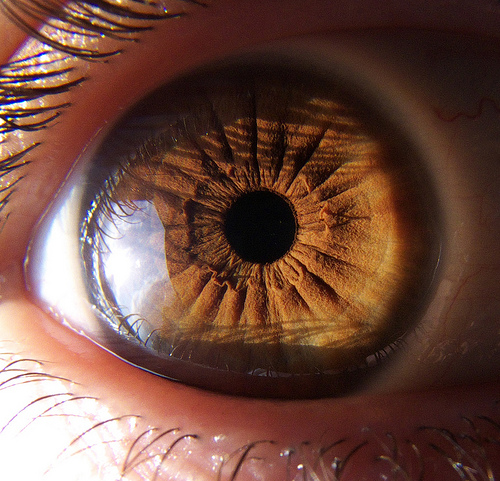Iridologists have said that there are only two basic colours for the iris, blue and brown. Perhaps this was so, but now there has been so much intermarriage of races in the world that we likely have a genetic mix of colours. Of course, we usually see the basically blue or brown iris but there are irises which we call “mixed” when it becomes obvious that in addition to the basic colour there is a strong genetic influence of another colour. There are instances where it becomes very difficult to determine exactly which colour is the true basic colour. Also, drug settlements in the body can make the iris appear a colour which is different than its true and basic colour.

Brown Iris
Brown Eyed Type (German: Haematogenic)
Description
Pure brown eye with pigments covering iris fibre structure. Related to the primary colour red and the physical aspect of health. Probably Chinese constitutional types: fire and earth. Probability related to Western fire and earth constitutions as well.
Tendencies
Pure brown eyes are difficult for Iridologists to read because a layer of pigment completely covers up the fibre structure of the eye. However, Iridologists have noted some general characteristics of brown-eyed people. First, they appear to be pre-disposed to imbalances in blood composition and hence to blood disorders. It has been suggested that they have a possible inherent inability to store adequate supplies of minerals. They may especially have problems with calcium metabolism. Specific systems and organs to pay particular attention to are: The circulatory system (heart, blood, blood vessels), the organs that make blood (liver, spleen, bone marrow), the digestive system and the endocrine glands.
Common health problems experienced by brown-eyed people include: Anaemia, hardening of the arteries, all types of blood diseases, constriction and hardening of lymph tissue, possible reduced leukocytes in the blood, digestive troubles, mineral deficiencies and early breakdown of the endocrine glands.

Blue Iris
Blue-Eyed Type (German: Lymphatic)
Description
White collerette (autonomic nerve wreath), solid blue or gray/blue color with no discoloration or psora (pigments). Related to the primary colour blue and the spiritual aspect of health. Strong tendency towards Western phlegmatic (water) constitution and Chinese water, metal constitutions.
Tendencies
This is the “pure” blue eye that is found in people’s of European descent. It usually accompanies a classic phlegmatic disposition which means the person is prone to lymphatic disturbances and catarrh afflictions. This is probably due in part to the fact that people of European descent are frequently heavy consumers of dairy products. Blue-eyed people are also thought to have a greater tendency to accumulate uric acid in their bodies and to have kidney troubles. The body systems and parts that these people have to pay particular attention to are the following: Mucus membrane areas (upper respiratory tract, bronchioles, villi of lungs, digestive tract and the uro-genital tracts), lymphatic tissues (tonsils, appendix, spleen and lymph nodes) and membranes of the joints.
Health problems commonly found in people with the lymphatic constitution include the following: Sinus troubles, sore throats, tonsillitis, earaches, bronchitis, asthma, swollen lymph nodes, skin catarrh (eczema and dandruff), kidney weakness, arthritis and rheumatism.

Mixed Iris
Mixed-Eyed Type (German: Biliary)
Description
Discolorations or psora (drug spots) on top of a blue background (fibre structure is visible through colour). Related to the primary colour yellow and the mental aspect of health. Strong tendency towards Chinese wood, earth constitutions and the Western air constitution.
Tendencies
The blue/brown mix eye has been linked by Iridologists with a disposition to biliary or hepatic (liver) troubles. It is believed that the colorations on top of the blue eye are a sign of toxicity in the body due to digestive problems. When the pigmentation is concentrated around the centre of the eye, this is especially linked with digestive disturbances. Problems with the liver and other digestive organs can lead to further imbalances in the glandular and circulatory systems. Body systems and organs to pay particular attention to are as follows: The digestive system (stomach, pancreas, gall bladder and especially the liver) and the intestinal tract.
Common health problems Iridologists associate with this type are: Hypoglycemia, PMS, indigestion, gallstones, constipation, gas, toxicity of the digestive tract, anger and/or depression, difficulty getting to sleep followed by difficulty waking up in the morning, nausea, stiffness and achiness, headaches (especially migraines), food allergies, seasonal allergies and Candida.
Colours
Colours have strong meaning in this eye type:
Straw Yellow: Relates to the kidneys and suggests poor kidney function.
Neon Orange: Relates to the pancreas and suggests a tendency to blood sugar imbalances and problems with digesting (metabolising) carbohydrates.
Dirty Orange: May relate to either the pancreas or the gallbladder. Suggests some tendency as neon orange, but may also suggest gall bladder problems. Look for other signs of gall bladder problems (marks in gallbladder zone or fatty deposits in whites.)
Dark Brown: Related to liver function.
Reddish Brown: Suggests breakdown of the blood and a need to work with blood purification and building. Possible problems with liver, spleen and bone marrow.
Carina is available to lecture for your group or institution on this subject
Carina Harkin BHSc.Nat.BHSc.Hom.BHSc.Acu. is a practitioner of 11 years, complementary medicine lecturer of 4 years and mother of six in Galway, Ireland who practices what she teaches.
For an appointment call Carina directly on 083 34 66 333.
All products are available through www.carahealth.ie. Remember, we are here for a good time not a long time, enjoy your food life!
Carahealth Galway Ireland. Acupuncture, Naturopathy, Homeopathy, Herbal Medicine, Nutrition, Nutritional therapy, Flower essences, Iridology, Short Courses


















